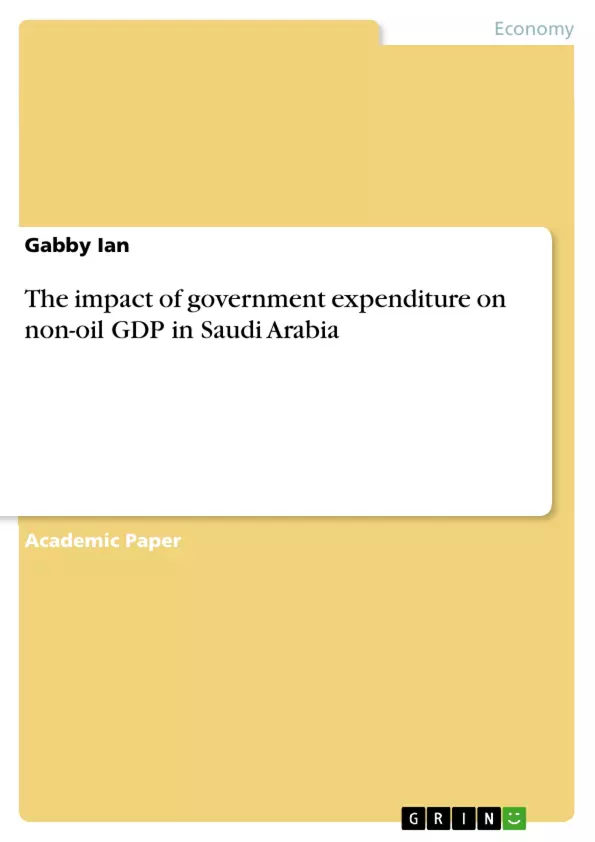Government expenditure refers to the money the public sector or the government spends on providing services such as education and the acquisition of essential goods and services. It entails interest payments, transfer payments, and government consumption categories. In this connection, the government has been developing policies that will make the economy more diversified and thus more stable. The policies aim to strengthen other sectors of the economy to make them profitable enough to contribute to its exports. The government of Saudi Arabia has been formulating and implementing favorable policies that will attract investors and create manufacturing firms in the country.
The non-oil industry has not been taking part in developing the country's economy. The impact of other industries on the economy has not been felt as it should have. According to World Bank statistics from 2011 to 2013, the country's economic performance has been going down to fluctuating prices for oil in the world market. Other sectors in the industry have not been active enough to protect the nation's Gross Domestic Product from going down, as they are not well established. According to World Bank Information, the growth rate of Saudi Arabia from 2002 to 2013 has not been steady. The economy's stability depends on the value of products from Saudi Arabia in the international market. The country has had to invest more in its local manufacturing industries to guarantee stable economic growth. One sector the country has invested in to ensure the non-oil industry makes a significant contribution to the growth and development of the economy is encouraging entrepreneurs to set up non-oil commercial activities. Industrialists will help diversify the industry; in the process, more revenue will be generated, which will be used to develop the economy. The value of non-oil products has been increasing as entrepreneurs invest more in the industry, intending to produce high-quality goods that can compete with goods from other countries in the world market. Entrepreneurs are drivers of innovation, which will transform the economy, making it more vibrant, just like developed nations' economies. In this regard, this paper examines the impact of government expenditure on non-oil GDP in Saudi Arabia.
Inhaltsverzeichnis (Table of Contents)
- Introduction
- Literature Review
- Impact of Agriculture on the Economy
- References
Zielsetzung und Themenschwerpunkte (Objectives and Key Themes)
This paper examines the impact of government expenditure on non-oil GDP in Saudi Arabia. The main objective is to understand how government investment can contribute to the diversification and stability of the Saudi Arabian economy, particularly in light of its dependence on oil revenue.
- The importance of diversifying the Saudi Arabian economy away from oil dependence
- The role of government expenditure in stimulating non-oil sectors
- The impact of entrepreneurship and innovation on economic growth
- The challenges faced by entrepreneurs in Saudi Arabia
- The contribution of various government sectors (education, health, housing, and social security) to overall economic development
Zusammenfassung der Kapitel (Chapter Summaries)
- Introduction: This chapter introduces the topic of government expenditure and its impact on non-oil GDP in Saudi Arabia. It highlights the need for economic diversification and the government's efforts to promote non-oil sectors. The chapter also discusses the challenges facing entrepreneurs in Saudi Arabia and the importance of innovation.
- Literature Review: This chapter reviews relevant literature on economic diversification in Saudi Arabia. It discusses various measures used to assess economic complexity and the importance of manufacturing value-added in promoting economic growth.
Schlüsselwörter (Keywords)
The main keywords and focus topics of this text include: government expenditure, non-oil GDP, economic diversification, Saudi Arabia, entrepreneurship, innovation, economic complexity, manufacturing value-added, government sectors (education, health, housing, social security).
Frequently Asked Questions
How does government expenditure affect non-oil GDP in Saudi Arabia?
Government expenditure is used to provide essential services and develop policies that diversify the economy, reducing its reliance on fluctuating oil prices.
Why is economic diversification important for Saudi Arabia?
Diversification ensures economic stability by strengthening non-oil sectors like manufacturing and agriculture, protecting the GDP from volatility in the international oil market.
What role do entrepreneurs play in the Saudi economy?
Entrepreneurs drive innovation and set up non-oil commercial activities, which generate additional revenue and help transform the economy into a more vibrant system.
Which sectors are being prioritized for economic growth?
The government invests heavily in education, health, housing, social security, and local manufacturing to support long-term development.
What is "manufacturing value-added" in this context?
It refers to the contribution of the manufacturing sector to the overall economy, which is a key measure of economic complexity and diversification success.
- Quote paper
- Gabby Ian (Author), 2022, The impact of government expenditure on non-oil GDP in Saudi Arabia, Munich, GRIN Verlag, https://www.grin.com/document/1239590



